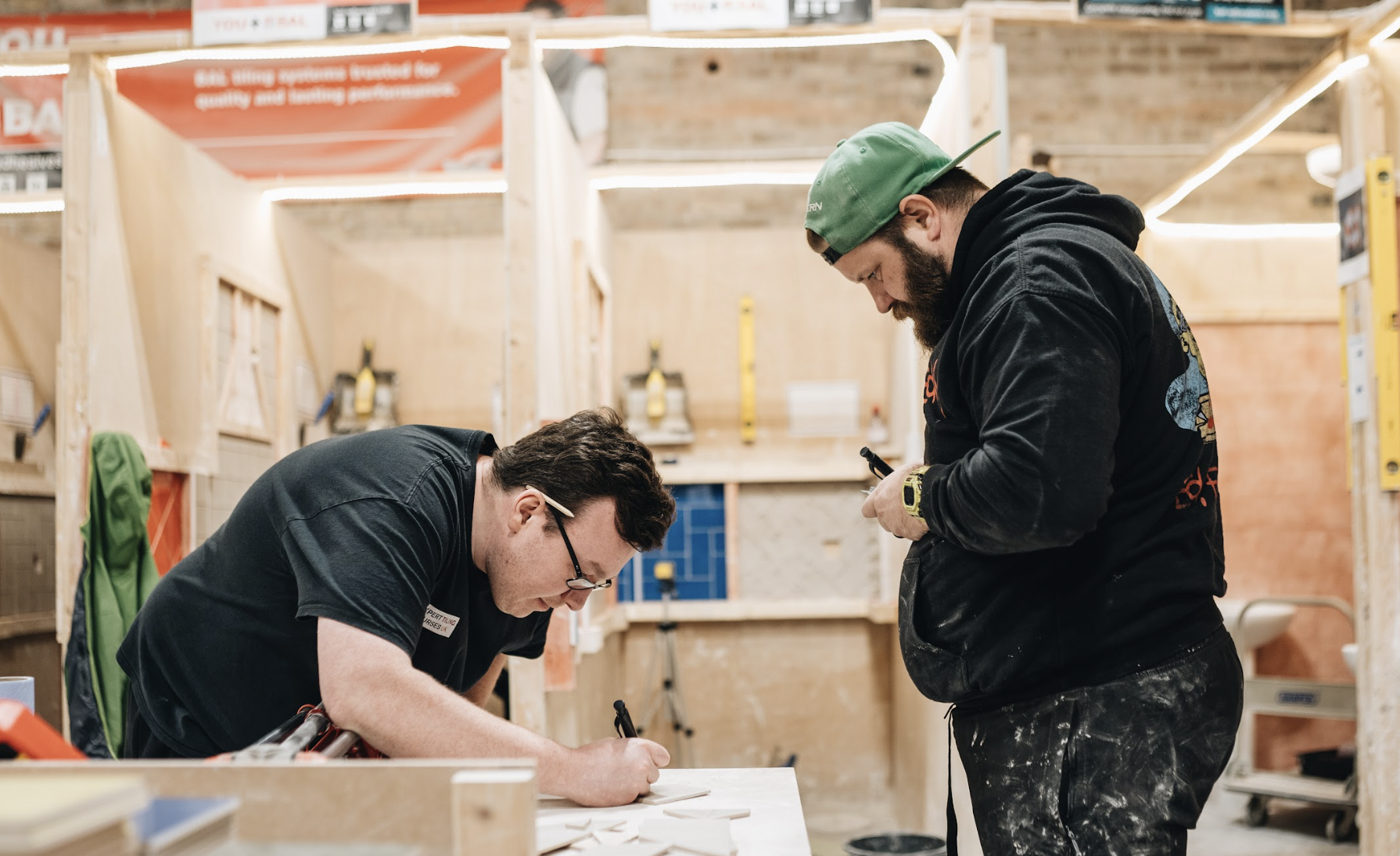How Tiling Courses in the UK are Adapting to Modern Trends

Want to know how tiling courses in the UK and Ireland are adapting to modern trends? This guide explores the integration of advanced technology, sustainable materials, and flexible learning methods in tiling education. Learn how these adaptations are equipping students with the latest skills needed to thrive in the tiling industry.
Key Takeaways
- Modern tiling courses are integrating advanced technology such as laser levels to enhance precision and efficiency in training.
- Courses are increasingly focusing on sustainable materials and waste reduction techniques to align with environmental standards and promote eco-friendly practices.
- Hands-on practical experience and specialised training in modern tiling courses prepare students for real-world challenges, improving their employability and skills.
Embracing Technological Advancements

One of the most significant shifts in the tiling industry is the integration of advanced technology into training courses. Modern tiling courses place a strong emphasis on embracing technological advancements to enhance both teaching and learning efficiency. This shift is driven by the need for precise, efficient, and error-free work in tiling projects.
Modern tools like laser levels and design software packages have made a big difference to the way students learn and apply their skills. These digital tools have replaced many traditional manual processes, enabling quicker and more precise layouts. The seamless transitions between theoretical knowledge and practical application make these courses particularly effective for students aiming to master the latest trends in the tiling industry.
Digital Tools and Precision Instruments
The use of digital tools and precision instruments in tiling courses is a game-changer. Laser levels and digital measuring devices have become standard in modern tiling courses. These tools eliminate the need for manual alignment checks, ensuring that every tile is placed with pinpoint accuracy. Advanced digital measurement tools and digital printing technology also allow students to replicate intricate patterns and textures with high precision, further enhancing their practical skills.
Online Learning Platforms
The advent of online learning platforms has made tiling education more accessible and flexible. These platforms provide students with the ability to choose courses that fit their lifestyles, making education more inclusive and adaptable to individual needs. Hybrid courses, which integrate online learning with traditional classroom experiences, are gaining popularity as they combine the best of both worlds.
Modular course designs further enhance this flexibility, allowing students to select specific modules that align with their career goals. This approach not only caters to the diverse needs of students but also ensures that they can gain the skills necessary to excel in various aspects of tiling.
Focus on Sustainable Materials

As environmental responsibility becomes increasingly important, the focus on sustainable materials in tiling courses has intensified. This shift reflects a broader trend in the construction industry towards eco-friendly options and practices. Tiling courses are now emphasising the importance of using sustainable materials and adopting waste reduction techniques to align with environmental standards.
This commitment to sustainability is not just about meeting industry demands but also about educating future tilers on the benefits of eco-friendly practices. Incorporating sustainable materials and eco-friendly installation practices in training is essential to fostering a new generation of environmentally conscious professionals.
Eco-Friendly Options
Eco-friendly options in tiling include a variety of natural materials, which contribute to sustainable building practices. These materials not only lower the carbon footprint but also promote eco-friendly construction methods. Utilising sustainable tile options can significantly decrease the environmental impact of construction projects.
Additionally, tiling courses are promoting water-efficient installation techniques to further support eco-conscious practices. These techniques, combined with the use of low-maintenance materials, ensure that the environmental impact is minimised throughout the lifecycle of a tiling project.
Waste Reduction Techniques
Waste reduction techniques are a crucial component of sustainable tiling practices. Training in tiling emphasizes the importance of reusing materials to minimise waste during projects. Careful planning and precise measurement are also taught to decrease material waste during installation, ensuring that every piece of material is used efficiently.
Advanced Skill Development
The tiling industry has identified a crucial need for enhanced training programs and specialised training to address skill shortages. Modern tiling courses are focusing on developing advanced skills to meet the growing demands for skilled professionals. This includes specialised modules that teach intricate techniques and the handling of complex geometric patterns.
Specialised training is essential to keep pace with the evolving trends and demands of the tiling industry. Focusing on advanced skill development ensures that graduates are well-equipped to handle even the most challenging projects.
Specialised Workshops
Specialised workshops are a common part of modern tiling courses, offering hands-on training in advanced skills. These workshops focus on specific techniques, such as installing large-format tiles, textured tiles, and hexagonal tiles. For large-format tiles, for example, it is crucial that the substrate is level, medium-bed mortar is used, and a levelling system is implemented.
These workshops not only enhance the skillset of tilers but also improve their employment opportunities and client satisfaction. Mastering advanced skills allows tilers to create spaces that are both aesthetically pleasing and functionally superior.
Adapting to Interior Trends

Staying current with interior design trends is crucial for tilers to meet client expectations. Recent tile trends in ceramic tiling showcase bold patterns, geometric motifs, and cultural influences. The resurgence of retro and vintage styles in ceramic tiling is driven by a desire for nostalgia and timeless elegance.
UK tiling courses are adapting to these changing trends by incorporating the latest styles and designs into their curriculum. This ensures that students are well-prepared to offer stylish, enduring, and budget-friendly solutions to their clients.
Popular Tile Styles
Popular tile styles are constantly evolving, with large format tiles and wood effect tiles currently in vogue for creating chic bathroom and inviting living room designs. Whimsical and vintage-inspired spaces are also gaining popularity, complemented by textured tiles and bright colours.
Mix-and-match ceramic tiling encourages geometric shapes, floral patterns, and abstract art, adding dynamic patterns to spaces. Hexagons and rhombuses are becoming popular innovative shapes in ceramic tiling, while marble effect tiles are favoured for their timeless sophistication and luxury appeal.
Colour Theory and Application
Colour theory plays a significant role in tiling, influencing the overall aesthetic appeal of a room. Colour psychology indicates that different hues can evoke specific emotional responses, impacting how spaces are perceived. For instance, cooler shades are suggested for summer, while warmer tones are ideal for winter, often enhanced by the use of contrasting colours.
Popular colour combinations in tiling include cobalt blue with sunny yellow and deep red with emerald green. Lighter colour tiles, particularly pastels, help make small spaces feel larger, especially when paired with vibrant hues.
Digital printing technology allows for custom designs, enhancing the possibilities in colour combinations and adding visual interest to any space.
Enhancing Practical Experience

Practical experience is a cornerstone of UK tiling courses, ensuring that students are well-prepared for real-world applications. Hands-on training in realistic settings allows students to enhance their practical skills effectively. This approach ensures that graduates are job-ready and capable of executing their tasks with precision and confidence.
Providing opportunities to work with various materials and tools ensures that students gain comprehensive practical experience. This focused training is essential for bridging the gap between theoretical knowledge and real-world applications.
Real-World Projects
Engaging in real-world projects is an integral part of tiling courses. These projects allow students to apply their learned skills in practical scenarios, reinforcing their knowledge and boosting their confidence. Programs that include hands-on training and business skills are essential for new tilers to successfully establish their careers.
Apprenticeships in tiling provide practical experience that bridges the gap between theoretical knowledge and hands-on skills. These opportunities ensure that students are well-prepared for the challenges they will face in the competitive market.
Industry Partnerships
Partnerships with industry leaders play a crucial role in tiling education. Collaborations with manufacturers provide students access to the latest tools and materials used in tiling. These partnerships ensure that students are trained using the most current techniques, making them highly competitive in the job market.
Health and Safety Standards
Health and safety standards are a critical component of modern tiling courses. Updated safety guidelines on handling heavy and hazardous materials are integral to ensuring a safe working environment. Courses emphasise the importance of maintaining safe working conditions to prevent accidents and injuries.
Incorporating comprehensive health and safety training ensures that students are well-versed in the best practices for a safe and efficient workplace. This training covers everything from ergonomics to the handling of hazardous materials, ensuring that students are fully prepared for the demands of their profession.
Ergonomics in Tiling
Ergonomics is an essential aspect of tiling, helping tilers work safely and efficiently. Tiling courses provide training on safe lifting techniques and proper body posture to reduce injury risk.
Emphasis is placed on using tools and techniques that minimise physical strain during tiling.
Handling Hazardous Materials
Proper handling of hazardous materials is crucial for maintaining safe working conditions in tiling. Courses cover the proper labelling, storage, and disposal methods for hazardous substances encountered in tiling.
Training also includes guidelines on protective equipment to ensure safety when dealing with toxic materials.
Promoting Tiling Careers
Promoting tiling careers is essential for attracting new talent to the industry. Public awareness campaigns highlight the benefits and opportunities in tiling careers.
Apprenticeships play a crucial role in providing hands-on experience and direct pathways into tiling professions.
Mentorship and Apprenticeships
Mentorship programs are vital for facilitating knowledge transfer and skill development among apprentices in the tiling industry. These programs help new tilers gain the advanced skills necessary to excel in their careers.
Summary
In conclusion, tiling courses in the UK are successfully adapting to modern trends by embracing technological advancements, focusing on sustainable materials, and emphasising advanced skill development. The integration of digital tools and online learning platforms has revolutionised tiling education, making it more flexible and precise. The shift towards eco-friendly practices reflects a broader commitment to sustainability in the construction industry.
By staying current with interior design trends and incorporating practical experience through real-world projects and industry partnerships, these courses ensure that graduates are well-prepared for the competitive job market. Health and safety standards are rigorously upheld, ensuring safe working environments. With a strong focus on recruitment and career development, including mentorship and certification programs, tiling courses across the UK are paving the way for the next generation of skilled professionals.
Frequently Asked Questions
Why is advanced skill development important in tiling courses?
Advanced skill development in tiling courses is essential to equip professionals with the expertise needed for intricate designs and large-format tiles, ensuring they meet industry demands. This level of proficiency enhances both aesthetic value and technical execution in tiling projects.
How do tiling courses incorporate practical experience?
Tiling courses incorporate practical experience through hands-on training in realistic settings, engagement in real-world projects, and collaboration with industry partners, ensuring students acquire essential skills.
Take a look at our tiling courses page to learn more about the leading tiling courses in the UK.
Find the perfect course for you
Whether you're just getting started, or have a few years in the construction industry under your belt and are looking to up-skill yourself, we have a course for everyone.







